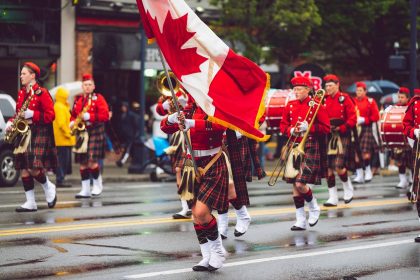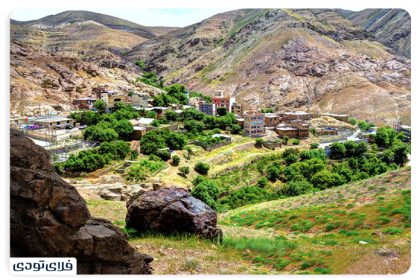Last update: December 6, 1402
list of titles
Maybe you are an immigrant looking for citizenship or a tourist who is fascinated by the beauty of the Netherlands. Maybe you are a student eager to attend Dutch universities. Anyway, understand Cost of living in the Netherlands It is important to you. Therefore, it is recommended to stay with this article. This article is a comprehensive guide for those who may not be fluent in Dutch but are looking to find out the truth about financial conditions and life in the Netherlands.
A few important points about Cost of living in the Netherlands
1- With an average level of Cost of living in the Netherlands You can experience a high level of living standards in this country. 2- Housing in the Netherlands is more expensive than most European capitals and not all of them. 3- Daily essential items such as food in the Netherlands have an average price and are comparable to neighboring countries. 4- Dutch health care, while high quality, may also come with higher insurance premiums. 5- Studying in Dutch public schools is basically free, but international studies in this country can be expensive. 6- The main currency in circulation in the Netherlands and the overall economic outlook in this country is based on the Euro. As part of the Eurozone, the Netherlands uses the Euro (€) as its official currency.
Average salaries in the Netherlands
Before dealing with Cost of living in the NetherlandsIt is necessary to have a clear understanding of the salary and income situation of the Dutch; In general, it can be said that compared to other Western European countries, the Dutch receive competitive and appropriate salaries. Of course, depending on the industry and profession, there are significant differences in wages. Let's check the salary situation in the Netherlands according to the latest updates:
The average gross monthly salary for entry-level jobs is around 2,900 to 3,500 euros. People with special expertise or experience may receive monthly salaries in the range of 4,500 to 6,000 euros. The more specialized the jobs, the higher the wages will be. Of course, it is worth noting that the Dutch system often declares salaries in gross form. That is, the aforementioned figures are before tax deduction.
Cost of living in the Netherlands
1- Cost of housing and accommodation
one of the most important Cost of living in the Netherlands Or any other country you want to move to or stay in for a long time is the cost of housing and accommodation. Fortunately, the Netherlands has a distinct mix of metropolitan homes and quiet suburbs and offers its residents a variety of housing options. However, it is worthwhile to better understand the dynamics of the housing market and other housing-related costs in this country so that you can make more informed decisions. The table below is some Cost of living in the Netherlands (including the cost of housing) compares with the European neighbors of this country and develops your mindset about such costs.
| Comparison with European neighbors | category of expenses |
| Cheaper than London or Paris and more expensive than Prague and Warsaw | Housing |
| On par with Germany or Belgium and cheaper than Northern European countries | Daily essentials |
| More expensive than Spain or Portugal and cheaper than England or Switzerland | Transportation |
| More expensive than Spain or Italy and more affordable than the US or Switzerland | Health Cares |
| Public education is free. International education is comparable to the main European centers. | education |
| Cost of food, more affordable than Paris or London and more expensive than Lisbon or Athens | free time |
Table comparing the cost of living in the Netherlands with its neighboring countries.
Comparison of housing costs in the Netherlands (comparison of rent)
Amsterdam: The capital and the most popular city of the Netherlands for expats, tourists and international students. Due to the global appeal of Amsterdam, the highest housing costs in the Netherlands are related to this city. As for average rent, a one-bedroom apartment in the city center of Amsterdam will probably cost between 1,200 and 1,800 euros per month. While the rent in the suburbs of this city may be around 900 to 1400 euros.
Rotterdam and Utrecht: Both of these cities are rich in culture and commerce, and as a result are often considered more affordable alternatives to Amsterdam. In the heart of these cities, expect monthly rent for a one-bedroom apartment to range from €900 to €1,400, with suburban rates typically around 20% cheaper.
Other cities: It is recommended not to ignore other cities and continue exploring to reduce housing costs in the Netherlands. Places like The Hague, Groningen, and Eindhoven each have their own unique charms, and you'll likely find better rental prices there as well.
Housing costs in the Netherlands based on furnished or unfurnished rental homes
In addition to the location, whether the houses are furnished or not has a great impact on housing costs in the Netherlands. Furnished apartments save your initial expenses related to the purchase of furniture and furnishings. Instead, you have to pay more rent for such houses. Typically, the difference in rent between furnished and unfurnished houses in the Netherlands can range from €50 to €200 per month.
Housing costs in the Netherlands (property purchase price)
some people Cost of living in the Netherlands are separated from housing costs. In this way, instead of renting to others, they buy a private property. Investing in real estate is a more common decision for those who intend to live permanently in the Netherlands. The Netherlands has a free real estate market and foreigners do not have many restrictions to buy property in this market. Property prices, like rent, are more expensive in the big cities of the Netherlands and become cheaper as you move towards the suburbs. According to the latest statistics, the average property price in Amsterdam is around 4,500 to 6,000 euros per square meter. Real estate in Rotterdam, Utrecht and other big cities are also slightly cheaper.
Another important point is that when buying a property, there are a series of additional costs that you should also pay attention to, including: notary fees, transfer taxes, and potential real estate agency fees. These side costs can be as much as 5 to 10% of the price of the property itself.
2- Cost of electricity, heating and water
Cost of living in the Netherlands They are beyond the cost of accommodation and include many other things, including the cost of municipal services; The Netherlands has a high standard in terms of municipal services. On average, for a standard apartment of 85 square meters, the combined monthly cost of these services is estimated between 150 and 200 euros. This cost can vary and fluctuate based on factors such as insulation, personal usage habits and the type of energy contract you have. The important thing is that you need to be more careful about electricity consumption in the Netherlands so that you don't incur high costs. For example, always use efficient electrical appliances in terms of energy consumption. Appliances that save your money both in the short and long term. Plus, compare energy providers regularly. Because switching these providers from time to time can get you better rates.
3- Internet and communication costs
Although this item is not very expensive, it is still included Cost of living in the Netherlands and we should not ignore it. In the digital age, staying connected to the internet is vital. The Netherlands has a strong infrastructure to provide high-speed internet. Monthly fees for an Internet connection with unlimited bandwidth in this country usually range from 30 to 50 euros. Some users, along with the Internet, also receive paid services related to television and landline phones. Services that can be useful and affordable depending on the provider.
4- Transportation costs
Seamless movement within and between Dutch cities is a central aspect of life in this country. As a result, you should naturally include transportation costs Cost of living in the Netherlands consider Fortunately, this country is famous for its punctual and efficient public transportation system. A system that can greatly save your transportation costs. In addition, there is an admirable cycling culture in this country and you can follow this culture as well.
There is a major transport service provider called OV-chipkaart that can reduce your transport costs in the Netherlands. You can buy transport cards of this company and use them for buses, trams, metros and trains in the Netherlands. The cost of each transportation card is about 7.5 euros, and how many cards you need in a month depends on the amount of trips and distances you travel.
Car costs also depend on the distance traveled, and short city trips usually cost between 1 and 3 euros. Travel costs with intercity trains also vary. For example, a one-way trip without any subscription from Amsterdam to Rotterdam costs about 15 euros. If you travel frequently by train, buy a Dal Voordeel subscription and save about 40% on your transportation costs every year. You can also take advantage of monthly subscriptions from other urban transport providers, such as GVB in Amsterdam or RET in Rotterdam. Subscriptions that cost around 90 to 100 euros per month.
Owning a private vehicle in the Netherlands
Managing transportation costs in the Netherlands does not conflict with owning a personal vehicle. Let's look at some of the types of private vehicles in the Netherlands and the costs of each; 1- Bicycle: The Netherlands is often known as the bicycle capital of the world. In this country, a new and quality bike can cost between 200 and 600 euros. Second-hand bikes are also available for around 50 to 150 euros. Of course, don't think that because you live in a European country, there is no possibility of your bike being stolen. Therefore, it is better to buy a suitable lock for your bike.
2- Car: The next item is a personal car. Having a private car can multiply your transportation costs in the Netherlands. Private car costs include initial purchase, fuel, insurance, road tax and maintenance. The price of gasoline in the Netherlands is around 1.60 to 1.80 euros per liter. Car insurance can also vary significantly based on factors such as your age, driving experience and the type of car you have. In total, for insurance, an annual cost of around 500 to 1500 can be expected. In urban centers, you should also pay attention to the price of parking. Parking rates in busy areas such as the center of Amsterdam range from 5 to 7.50 euros per hour. 3- scooter or motorcycle; Scooters or motorcycles are also popular with those who want a vehicle in between a bicycle and a car. The price of a new scooter can range from €800 to €2,500, with electric options being more expensive. There are also costs including insurance for scooter riders and motorcyclists.
5- The cost of health care
Health and medical services also have costs that are under the set Cost of living in the Netherlands Placed. In fact, quality healthcare services are the cornerstone of a nation's well-being, and the Netherlands is a leading country in this field with its strong healthcare system. The most important elements of the Dutch health care system are as follows: 1- Basic health insurance (Basisverzekering): In the Netherlands, all residents must have at least basic health insurance. This insurance includes standard medical care, including visits to general practitioners, most medical services, and receiving medication. Premiums vary based on providers of this type of insurance and specific coverages. However, as an estimate, monthly expenses of around 100 to 130 euros can be expected for this issue.
2- Supplementary insurance (Aanvullende verzekering): while basic insurance is often enough, some people like to have supplementary insurance to cover things like dental care, physiotherapy, alternative medicines, etc. The premium of such insurances will vary between 5 and 50 euros per month depending on the level of coverage. 3- Medical services and costs: a) Cost of general practitioner (Huisarts) Without insurance, a standard general practitioner visit may cost between 30 and 60 euros. b) Specialized and pharmaceutical treatments: with the mandatory basic insurance, usually a significant part of these costs are covered. c) Dental care: regular dental examinations or treatments are usually not covered by basic health insurance. As a result, a typical dental examination may cost between 20 and 40 euros. Treatments such as filling, root extraction, implants, etc. are several times more expensive.
6- The cost of eating out
Food costs are also included Cost of living in the Netherlands Placed. In the Netherlands, there are many options for eating out. Options that fit a wide range of budgets. In general, a meal in an average restaurant can cost between 20 and 40 euros per person. While the cost of a more luxurious dining room is around 70 euros. The culture of going to cafes is also thriving in this country and a coffee or tea in regular cafes will cost around 2 to 4 euros.

Tips for management Cost of living in the Netherlands
Along with the possibility of enjoying a lively cultural and urban life, many solutions for management Cost of living in the Netherlands there are. Let us tell you some of these solutions in the form of advice: 1- Embrace the cycling culture in the Netherlands. 2- Buy from local markets; Local or weekly markets in the Netherlands offer fresh produce, cheese, flowers and other essentials, often at lower prices than supermarkets. The most famous of these markets are Albert Cuyp Markt in Amsterdam or Binnenrotte Markt in Rotterdam. 3- Take advantage of discount cards and subscriptions. 4- Choose shared housing or living outside urban centers.
5- Take advantage of second-hand shops; The Dutch have a thriving thrift store culture. Stores like kringloopwinkels offer everything (from furniture to electronics) at a fraction of the original price. 6- Cook at home. 7- Take advantage of student discounts. 8- Visit websites for buying and selling goods in the Netherlands; Websites like Marktplaats.nl for second-hand deals or Groupon.nl for discounts on services, dining and entertainment can give you significant savings.
For advice on immigration or studying in the Netherlands, contact Dr. Mehrayin Mokhbari's Immigration Institute.
Frequently Asked Questions
1- What is the average income in the Netherlands?
– The average monthly gross salary for entry-level jobs is around 2900 to 3500 euros. People with special expertise or experience may receive monthly salaries in the range of 4,500 to 6,000 euros.
2- How much does it cost to buy a property in the Netherlands?
According to the latest statistics, the average property price in Amsterdam is around 4,500 to 6,000 euros per square meter.
3- How much does a general practitioner visit cost in the Netherlands?
– A standard general practitioner visit may cost between 30 and 60 euros.
RCO NEWS















